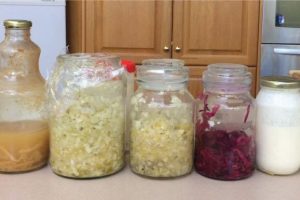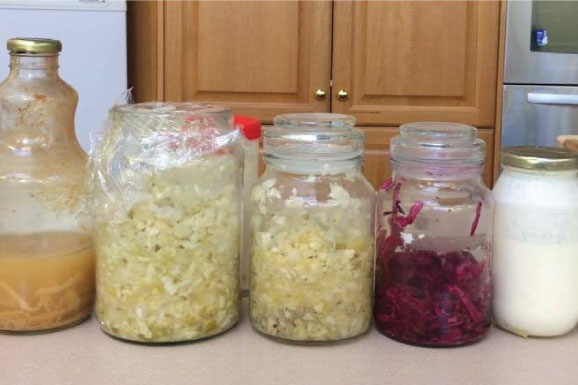It’s funny how things play out. I never thought I would be teaching people how to make fermented foods, but that’s how the Universe works sometimes. I had been selling pickles, chutneys, jams and sauces for over a year in my local community, through a popular local community buy, sell group. One day, a program organiser at a local community centre contacted me to organise a workshop for people to learn pickling and jamming and fermentation, and in talking with her, we realised that what would be popular would be fermentation.
I was very surprised, and up for the challenge, as thus far I had only made sauerkraut and yoghurt and apple cider vinegar for our own use. As I planned the workshop, I realised I knew more about fermented foods than I had thought. My journey in healing my body after intensive and extended antibiotic use after contracting Golden Staph in hospital, has now lead me to teaching others how to support their own bodies’ gut health! And I was already excited by recent research that showed the link between gut health and mental health, and in the planning stages, even more information came up. One of the links was my father-in-law telling me he had happened to see an episode on “Trust Me, I am a Doctor” talking about gut health and fermented foods!
I have learnt to listen to signs from the Universe by then, so I went with it.
And that’s how my popular Introduction to Fermented Foods Workshops came about. We were booked out in the first two workshops, and I have now extended to teaching the workshops in other locations – Aminya Adelaide Natural Therapies Academy and the Workers’ Educational Association (WEA) of South Australia - and am planning more workshops for different fermented foods. That is the beauty of fermented foods – there are so many different types coming from different cultures, and it is about cultivating a relationship with different ferments so we find which work best for our bodies and our lifestyles.
I am adamant that this information should be as accessible as possible. Yes, there are many resources online that we can access to learn and teach ourselves, but some people learn better with in-person classes and a hands-on approach. And I am pleased that in working with the community centre and now the other locations where I am teaching the workshops, we have the same aim that education and health is for everyone, not just the privileged or the wealthy who can afford healthy foods. For that end, we keep the costs as low as possible while still respecting my time and efforts (self-worth in action!) as well as the organisers’ time and effort organising and promoting the workshops.
Funnily enough, my aim is one day, I don’t need to run these workshops anymore, as most people know how to make different fermented foods at home for their own health and wellbeing, and share the probiotic cultures around!


